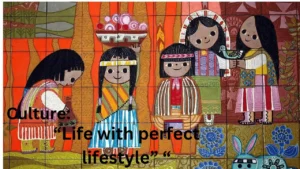Introduction:
In 1869, Matthew Arnold wrote a famous book called “Culture and Anarchy.” He talked a lot about society and civilization, especially during the mid-Victorian era in England when things were kind of messy. Arnold wondered about the purpose of culture and how it disagreed with the disorder around him.
This version of the book gives readers a real look into what was going on back then and the discussions around Arnold’s thoughts. It includes the original book but also adds some extra insights in the introduction and notes. Even though times have changed, Arnold’s ideas still matter, especially when discussing culture in today’s world with all its variety and modern challenges.
So, let’s take a closer look at Arnold’s ideas and how they still affect how we think about civilization and society.
What is culture? From Arnold’s point of view:
According to Matthew Arnold, culture contains the distinctive behaviors displayed by humans and the definite objects necessary to these behaviors. This all-around view of culture includes language, ideas, beliefs, customs, institutions, and various relics such as tools, art, rituals, and ceremonies.

“Society with perfect lifestyle”
Matthew Arnold defines culture as:
“the pursuit of our total perfection through getting to know, on all the matters which most concern us, the best which has been thought and said in the world, and, through this knowledge, turning a stream of fresh and free thought upon our stock notions and habits.”
Concept of Anarchy:
Matthew Arnold had some strong ideas about how society works in his book “Culture and Anarchy.” He saw anarchy as a big problem, especially during the mid-Victorian times in England. Anarchy, for him, meant chaos and confusion with no clear rules to follow, especially as democracy was starting to take hold.
“Society with wrong directions”
On the other hand, Arnold thought culture was the opposite of anarchy. He believed culture meant trying to be the best we can be by learning and improving ourselves. While culture aims to make society better by promoting good ideas and values, anarchy does the opposite by causing disorder and going against what’s already established.
Culture and Anarchy: An Essay in Political and Social Criticism” by Matthew Arnold.
Let’s talk about “Culture and Anarchy: An Essay in Political and Social Criticism” by Matthew Arnold. This important book dives into big questions about culture, society, and how things are governed. Arnold looks closely at the clash between culture and anarchy, giving us a deeper understanding of what was going on in Victorian England and beyond.
In the book, Arnold breaks down his ideas into six chapters. Each chapter looks at different parts of culture and anarchy, showing us how they affect society. He talks about things like trying to be perfect and how the government can help make culture better. Arnold’s ideas are complex, but they help us see how politics and society work together.
Let’s take a closer look at the interesting ideas Matthew Arnold brings up in “Culture and Anarchy.”
Chapter: 1) Sweetness and Light:
“Culture makes life sweeter and brighter for everyone”
In the first chapter of “Culture and Anarchy” called “Sweetness and Light,” Matthew Arnold talks about how culture can change society for the better. He says culture brings joy and enlightenment to people’s lives, making everything brighter and happier.
Arnold believes culture isn’t just for rich or educated people. Instead, he thinks it’s something everyone should have because it helps us understand what’s beautiful, true, and good. This understanding brings people together and gives them a sense of purpose.
Arnold thinks culture can inspire us to be better by making us curious, morally upright, and appreciative of beauty. He gives examples to show how important culture is for both individuals and communities.
Chapter: 2) Doing as one likes:
“We should do what’s right, not just what we want”
In Chapter 2 called “Doing as One Likes,” Matthew Arnold talks about how individual freedom affects society. He doesn’t agree with the idea that freedom means doing whatever you want without thinking about others. Instead, he believes freedom comes with responsibilities and moral rules
Arnold argues that if people only focus on what they want without thinking about what’s right or wrong, it can cause a lot of problems in society. He thinks that everyone should have self-control and think about what’s best for everyone, not just themselves.
Arnold wants people to understand that true freedom comes from doing what’s morally right and considering how it affects others. He wants us to see that it’s important to balance our desires with what’s good for society as a whole.
By talking about the idea of doing as one likes alongside moral obligations and social harmony, Arnold makes us think about how individual freedom and society’s well-being are connected. He encourages us to think beyond just ourselves and consider what’s best for everyone.
Arnold’s ideas make us realize that freedom comes with responsibilities, and we need to think about how our actions affect others.
Chapter: 3) Barbarians, Philistines, and Populace
“Society has different groups with different impacts”

In Chapter 3 of “Culture and Anarchy” called “Barbarians, Philistines, and Populace,” Matthew Arnold talks about three different groups in English society. He describes them in detail and explains how they influence society.
1. The Barbarians:
They seem fancy and polite, but they don’t care much about learning or improving themselves.
They reject culture and civilization and also create a negative example for the rest of the classes.
2. The Philistines:
They are strict about morals and energy, but they don’t appreciate culture or beauty and also have a lack of appreciation. Arnold criticizes them as they are barriers to advancement.
3. The Populace:
Lastly, the Populace is seen as rough and not very aware of the benefits of being educated or morally upright. This group of society is defined as powerless as compared to others as they lack empowerment.
Arnold paints a clear picture of each group, showing their different values and attitudes. He believes that even though the Barbarians seem noble, they’re missing out on the important parts of culture. The Philistines, despite their influence, focus too much on material things and don’t care about culture. Meanwhile, the Populace has potential but needs education and exposure to culture to thrive.
By exploring these social groups, Arnold helps us see the challenges Victorian society faced. He encourages us to go beyond social labels and embrace the values of joy and enlightenment to truly make progress.
chapter:4 ) Hebraism and Hellenism
“Both ethics and aesthetics are important for a balanced culture”
In Chapter 4 of “Culture and Anarchy” called “Hebraism and Hellenism,” Matthew Arnold talks about two ancient civilizations and how they’ve influenced Western thinking.
Arnold describes “Hebraism” as being about moral and ethical ideas from the Judeo-Christian tradition. He says it’s all about doing the right thing, following rules, and being good. He believes Hebraism has shaped the moral backbone of Western society.
On the flip side, Arnold contrasts Hebraism with “Hellenism,” which is more about beauty, balance, and intellectual excellence from ancient Greek culture. Hellenism focuses on appreciating art, asking questions, and learning for the sake of learning.
Throughout the chapter, Arnold discusses the tension between these two sets of ideas and how they’ve affected individuals and society. He thinks Hebraism gives us moral direction but can also make us closed-minded. Meanwhile, Hellenism encourages us to be curious and appreciate beauty but might lack a strong moral foundation.
Arnold suggests that we need to find a balance between Hebraism and Hellenism. He thinks that blending their ethical and intellectual aspects will help create a better society where people are both good and smart.
chapter:5 ) Porro Unum Est Necessarium
“One thing is needful that is culture”
In Chapter 5, Matthew Arnold talks about the idea of the “one thing needful” and why it’s important in our quest for a better society.
Arnold believes that among all the things we pursue in life, there’s one most important thing: the pursuit of knowledge and goodness, which he calls “culture.” He thinks this should be our top priority because it leads to true fulfillment and happiness.
Throughout the chapter, Arnold stresses the need to focus on improving our minds and spirits instead of just chasing after material things or short-term pleasures. He encourages us to think deeply about what matters and to strive for self-improvement.
Arnold challenges us to rethink our values and priorities, suggesting that by focusing on what’s truly important, we can find deeper meaning and purpose in life. He believes that if society as a whole values knowledge and moral goodness, we’ll be better equipped to face the challenges of the modern world and create a better civilization.
Chapter:6 ) Our Liberal Practitioners:
“We need a balanced approach to politics and society”
In Chapter 6 of “Culture and Anarchy” titled “Our Liberal Practitioners,” Matthew Arnold talks about the leaders of society during his time, who he calls “liberal practitioners.”
Arnold takes a close look at these leaders, especially those who claim to be liberal. He wonders if they really follow the true ideals of liberalism, like striving for knowledge and moral improvement, or if they’re just looking out for themselves.
Throughout the chapter, Arnold points out how these leaders often don’t match up with the principles they claim to believe in. He says many of them care more about their political gains than about what’s best for everyone, which goes against the ideas of freedom, fairness, and justice.
Arnold wants leaders to be more honest and caring about the greater good. He thinks they should focus on promoting learning, moral growth, and unity among people, which are the true values of liberalism.
Additionally, Arnold urges us, the readers, to keep an eye on our leaders and expect them to do better. He believes it’s important for all of us to be involved in our communities and speak up for what’s right, so we can shape a society where true liberalism and cultural progress can thrive.
Conclusion;
To sum it up, in “Culture and Anarchy” by Matthew Arnold, we explore how society works, the role of culture, and how we run things. Arnold talks about different ideas—culture trying to be perfect, while anarchy messes up how society works.
Arnold wants us to think about what culture means and why anarchy causes problems. He says we need to find a balance by mixing the good values of Hebraism with the smart and artsy stuff from Hellenism. He thinks if we do this, we can make a society where we care about being good and smart.
Arnold also talks about how he’s not happy with how liberalism and its leaders act. He thinks they should be more honest and get regular people like us more involved. He says we should keep an eye on them and ask for better behavior.
Through “Culture and Anarchy,” Arnold wants us to think about what values should guide our society. He reminds us that culture can make us smarter and help us make the world better.
So, as we deal with all the complicated stuff today, Arnold’s ideas remind us to aim for a society where everyone is curious, honest, and treated fairly.
